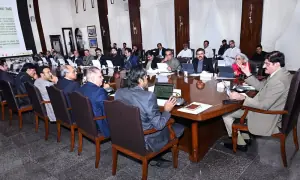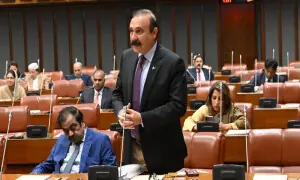SC judge Justice Shah calls for developing ‘firewall’ to prevent interference
4 min readSupreme Court senior puisne judge Justice Mansoor Ali Shah has stressed the need for developing a firewall around the judicial system to prevent any interference in judicial matters.
“Judiciary will stand united against any interference that will come their way. There must be a firewall,” he said in his address to the fifth Asma Jahangir Conference with the theme of ‘People’s Mandate: Safeguarding Civil Rights in South Asia’ at the Faletti’s Hotel in Lahore on Saturday.
“The justice system cannot be weakened because after that every institution will be weakened.”
His comments come as the new apex court bench, of which he is a member, would take up the suo motu proceedings on the alleged judicial meddling in the judiciary on April 30.
The case relates to the March 25 letter by six Islamabad High Court judges to the Supreme Judicial Council. They demanded that a judicial convention be summoned over the alleged interference of intelligence agencies in the judiciary.
The six judges who signed the letter are Justice Mohsin Akhtar Kiyani, Justice Tariq Mehmood Jahangiri, Justice Babar Sattar, Justice Sardar Ejaz Ishaq Khan, Justice Arbab Muhammad Tahir, and Justice Rafat Imtiaz.
The SC judge, who inaugurated the event, said that the apex court bench hearing the suo motu case on the IHC letter was also looking into a firewall against interference.
“Without justice, no institution can function or survive,” Justice Shah said in his message to all institutions.
“Every institution is weakening itself if you weaken the justice system,” he said, “the justice system has to be strong, robust and independent for all the other institutions to develop, grow and prosper.”
The SC judge reminded the people that the Constitution stated that the judiciary should be independent. He admitted that the judiciary made some controversial decisions, but added that the whole justice system should not be discredited on the basis of such decisions.
He spoke on a wide range of topics related to the judiciary, including gender representation.
The population of Pakistan is 230 million and 50 per cent are women but little gender representation in the judiciary, he said and added: “A woman has a different perspective. Only two judges in the SC are women. We will bring more women at the judiciary level and decision making will change.”
He went on to add that the judiciary needed to revisit how the judges were appointed at all levels and look at the examination pattern followed.
“The appointment process has to be state of the art,” he said, adding that judges should only be appointed on merit.
Also, read this
CJP Isa says received ‘not a single complaint’ of meddling so far under his watch
PPP chief Bilawal calls for judicial reforms after Zulfikar Bhutto’s case
Won’t tolerate executive interference in judiciary, says CJP Isa
“We have to be clear about the person we are inducting as a judge because he has to stay in the system for 20 years,” he said and added that judges who are not performing in the system should be expelled immediately.
“If a judge is incompetent, sluggish or he doesn’t work, he should be kicked out on misconduct,” he said
“We have to make our Supreme Judicial Council (SJC) more empowered,” he said adding that the SJC could not tolerate corruption and incompetence.
The Asma Jahangir Legal Aid Cell in collaboration with the Supreme Court Bar Association and Pakistan Bar Council, hosted the event.
AJCONF has come to be known as the largest human rights conference, according to the press release of the event. “It aims to pursue the courage and determination that defined Asma Jahangir’s professional legacy – providing a much-needed space for advocacy of human rights,” it said.
Following few structural reforms
The top court judge acknowledged that there have been “dark patches in the history and he was not proud of that.”
“To get a strong independent judicial system we should follow a few structural reforms,” he said and added that the judiciary was working with 4,000 judges across Pakistan. “But most of the judgements are not credible. The system is dysfunctional. It is sluggish and needs to be made expeditious.
“There are 13 judges per million [in Pakistan], the average international benchmark is 90 judges per million,” he said, adding that Pakistan would need a strength of 21,000 judges to meet the international benchmark.
He also said that in Pakistan, there were about 238,000 lawyers in a country of 231 million. “In the UK, there’s one lawyer for 203 people, in Pakistan there’s a lawyer for 1000 people,” the SC judge said.
“We need more lawyers but genuine lawyers,” he said.
Justice Shah suggested that courts should adopt new age information technology, change judges appointment process, and judges who are not performing well should be asked to leave.
For the latest news, follow us on Twitter @Aaj_Urdu. We are also on Facebook, Instagram and YouTube.
























Comments are closed on this story.